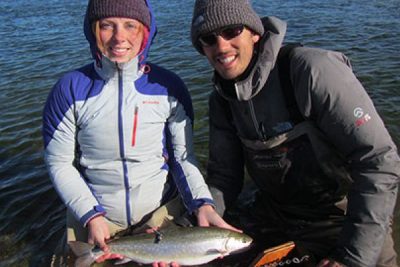A new teaching tool is being developed to help teachers bring real-world fish information to classrooms across Canada. Jacqueline Chapman, a PhD student in the Biology Department at Carleton University has been working with a team of colleagues and professionals to develop AquaTrax.
 Explains Chapman: “Aquatrax focuses specifically on telemetry data – data that is collected on fish movement by attaching tags that “ping” their location to either recording devices or satellites. We chose to focus on telemetry because the technology itself and the data that it generates encompasses so many different aspects – physics, mathematics, biology, ecology… the list goes on, while also allowing the incorporation of social science data like links to Indigenous cultures and history.”
Explains Chapman: “Aquatrax focuses specifically on telemetry data – data that is collected on fish movement by attaching tags that “ping” their location to either recording devices or satellites. We chose to focus on telemetry because the technology itself and the data that it generates encompasses so many different aspects – physics, mathematics, biology, ecology… the list goes on, while also allowing the incorporation of social science data like links to Indigenous cultures and history.”
“Our modules provide teachers with background information that they need ‒ videos on telemetry, research studies used for lesson modules, and lesson plans for the students.”
The data they are using is not only from their work, but also from other members of collaborative research networks, such as the Ocean Tracking Network.
They drew on their outreach experience and established relationships from World Fish Migration Day events to create a more formalized school-based program. They then submitted their proposal to NSERC’s PromoScience competition.
“We won, and it’s been growing ever since. The PromoScience and in kind funding from our partners has allowed us to involve highly skilled graphic designers, web designers, animators, and scriptwriters for our videos – something we never would have been able to do without their financial support. With every milestone we are more and more excited to continue developing AquaTrax and make sure we create something teachers and students will really enjoy.”
Chapman’s graduate research directly correlates with her AquaTrax activities as it focuses on salmon and how their health influences whether or not they survive after release from fisheries.
“I specifically assess microbial infective agents – bacteria, viruses, and microparasites – infection dynamics, fish physiological condition, and immune and stress gene regulation to investigate what factors influence an individual fish’s resiliency to fisheries capture,” says Chapman. “To do this, I take blood and small tissue samples to assess the fish’s health after they are captured, and either implant a telemetry tag and release the fish back in to the wild or place the fish into a holding pen to monitor their condition and survival.”
Her ultimate goal is to educate the public on the current state of our salmon as well as being able to predict what lays ahead for our fish populations when it comes to climate change.
“Salmon in particular are culturally and economically important not only within Canada but across the globe,” shares Chapman. “My research not only helps us understand a little bit more of what drives a fish’s individual resiliency to capture stress, but also provides a baseline of infective agents in regions that have not been surveyed in the past. As the environment is changing so rapidly, we need to know the current status of things like wildlife disease to be able to effectively monitor whether or not anthropogenic stressors like climate change or invasive species alter natural disease ecology, and to predict how these changes may effect fish populations.”
She is based out of Carleton working in Dr. Steven Cooke’s lab although she does her molecular lab work in B.C. with Dr. Kristi Miller-Saunders at the Fisheries and Oceans Molecular Genetics Lab in Nanaimo. Dr. Cooke is a Canada Research Chair in Fish Ecology and Conservation Physiology.
“Steve is an absolute powerhouse for fisheries research. He has helped me by being very open and enthusiastic about new ideas, opportunities, and pursuing new collaborations throughout my research. As an example, when I mentioned that I wanted to work with Dr. Miller-Saunders for my PhD, he contacted her and got things in motion almost immediately, something I am incredibly grateful for. Because I have been a member of Dr. Cooke’s lab and the nature of my PhD research, I have a very large research network. I have also been able to travel extensively for research and conferences throughout my time at Carleton.”
Chapman has received numerous awards such as the Canadian Society of Zoologists’ Leo Margolis Award for Excellence in Fisheries Research, the American Fisheries Society Peter A. Larkin Award for Excellence in Fisheries at the PhD level, a Carleton Graduate Research and Innovation Travel award. Her PhD was also NSERC, and OGS supported.
For more information about the Cooke Lab, click here
For more information about the PhD in Biology, click here.